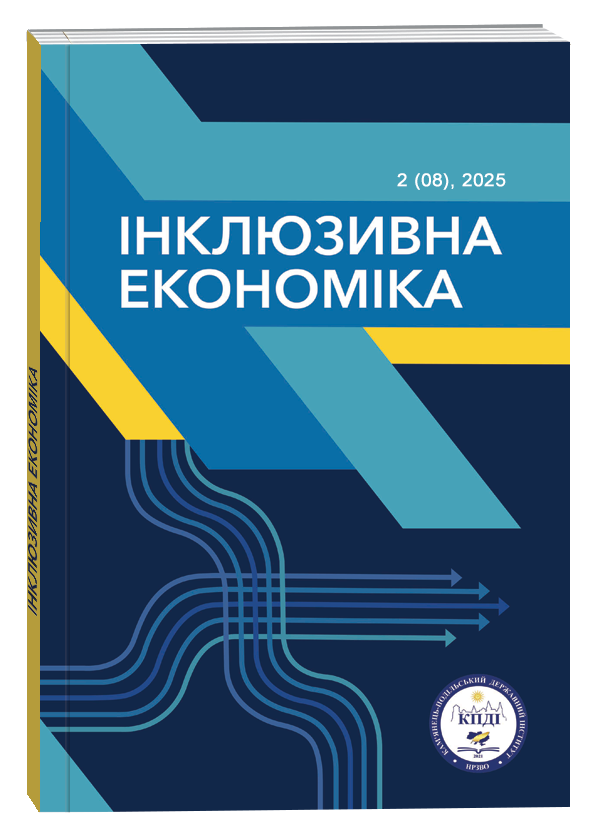LEADERSHIP AND SELF-ORGANIZATION OF EMPLOYEES IN THE PUBLIC SERVICE SYSTEM OF UKRAINE UNDER MARTIAL LAW
DOI:
https://doi.org/10.32782/inclusive_economics.8-6Keywords:
leadership, competence, self-organization, Public Service, civil servant, martial lawAbstract
This article examines the functioning of public authorities under martial law. The article emphasizes the urgent need to restore the personnel reserve of the civil service due to the acute shortage of qualified specialists in the field of Public Administration. The ongoing processes of reform and adaptation to military conditions, as well as the implementation of European standards of Public Administration, bring to the fore the issues of improving the public service system. The main objectives of this improvement are: convergence of the public administration system with European standards, professionalization of public servants, development of their leadership competencies, transformation of existing administrative mechanisms taking into account international experience, current global trends in improving the public service and challenges related to the war. A public position formally provides the manager with the necessary conditions for leadership, but it does not automatically make him a leader. In the conditions of war, the public authorities of Ukraine faced new challenges and tasks, such as providing administrative services, supporting the activities of business entities, organizing territorial defense of communities, evacuating the population and social protection of Internally Displaced Persons. Civil society institutions quickly adapted their activities to the conditions of martial law, directing them to help the defense and security forces, implement humanitarian, informational, educational, scientific projects, develop horizontal ties with other civil society institutions, public authorities, business and international organizations. Taking into account the quantitative indicators of the personnel composition of civil servants, the negative dynamics of staff turnover and in the conditions of military operation, it is extremely necessary to ensure effective processes for organizing personnel policy, and there is a need for modern Democratic leaders who present themselves as individuals with the highest elite qualities. Therefore, the knowledge, skills and competencies acquired during training are extremely important for the effective implementation of public administration, especially in senior positions. The formation of leaders should be based on improving the public administration system, creating the necessary institutional environment, in particular the legislative framework; anti-corruption policy; improving the skills of civil servants and local government officials.
References
Гординя Н. Д. Психологічні особливості прийняття ефективних управлінських рішень державними службовцями в умовах воєнного стану в Україні. Вісник Національного університету оборони України. 2023. № 1(71). С. 48–58.
Кириченко Р. В. Професійний потенціал особистості. Scientific Journal Virtus. 2015. № 4. С. 93‒97.
Ліпенцев А. В. Розвиток лідерства в органах публічної влади у контексті завдань надання якісних адміністративних послуг: теоретичні аспекти. Ефективність державного управління. 2014. Вип. 38. С. 21–42.
Логунова М. Соціально-психологічні аспекти управлінської діяльності. Київ : Центр сприяння інституціонального розвитку державної служби, 2006. 196 с.
Національне агентство України з питань державної служби. Дашборд щодо кількісного складу державних службовців в Україні. URL: https://nads.gov.ua/test?v=66de8f59549ff
Підлісна Т. В. Сучасні підходи до розвитку лідерства в органах публічної влади. Право та державне управління. 2021. № 2. С. 158–164. URL: http://pdu-journal.kpu.zp.ua/archive/2_2021/26.pdf
Про державну службу : Закон України від 10 грудня 2015 р. № 889-VІІІ / Верховна Рада України. URL: https://zakon.rada.gov.ua/laws/show/889-19.
Селіванов С. В. Механізми кадрового потенціалу державної служби в Україні: автореф. дис. к. держ. упр. : 25.00.02. Київ, 2019. 22 с.
Шевченко Л. Ю. Сучасні підходи до наукового вивчення лідерства. Актуальні проблеми психології. 2013. Том 6, Вип. 9. С. 516–524. URL: http://appsychology.org.ua/data/jrn/v6/i9/56.pdf
Шепель М.Є. Імідж державного службовця у воєнний та поствоєнний період в Україні. Публічне управління та адміністрування в умовах війни і в поствоєнний період в Україн: матеріали Всеукр. наук.-практ. конф., м. Київ, 15–28 квітня 2022 р. Київ, 2022. С. 56–58.
Bass B.M. Leadership and Performance. N.-Y.: Free Press, 1985. 375 p.
Bass&Bass. The Bass Handbook of Leadership: Theory, Research, and Managerial Applications. Bass&Bass. 4th ed. N.-Y. : Free Press, 2008. P. 459.
Hordynia, N. D. (2023). Psykholohichni osoblyvosti pryiniattia efektyvnykh upravlinskykh rishen derzhavnymy sluzhbovtsiamy v umovakh voiennoho stanu v Ukraini [Psychological features of making effective managerial decisions by civil servants under martial law in Ukraine]. Visnyk Natsionalnoho universitetu oborony Ukrainy, 1(71), pp. 48–58.
Kyrychenko, R. V. (2015). Profesiinyi potentsial osobystosti [Professional potential of the individual]. Scientific Journal Virtus, 4, pp. 93–97.
Lipentsev A. V. (2014). Rozvytok liderstva v orhanakh publichnoi vlady u konteksti zavdan nadannia yakisnykh administratyvnykh posluh: teoretychni aspekty. [Leadership development in public authorities in the context of the tasks of providing quality administrative services: theoretical aspects.]. Efektyvnist derzhavnoho upravlinnia. Issue 38, pp. 21–42.
Logunova M. (2002). Sotsialno-psykholohichni aspekty upravlinskoi diialnosti. [Socio-psychological aspects of managerial activity]. Kyiv. Center for Promoting Institutional Development of the Civil Service. 196 p. (in Ukrainian)
National Agency of Ukraine on civil service issues (2025). Dashboard on the quantitative composition of civil servants in Ukraine. Available at: https://nads.gov.ua/test?v=66de8f59549ff
Podlisna T. V. (2021). Suchasni pidkhody do rozvytku liderstva v orhanakh publichnoi vlady. [Modern approaches to leadership development in public authorities]. Pravo ta derzhavne upravlinnia. Issue № 2. pp. 158–164. Available at: http://pdu-journal.kpu.zp.ua/archive/2_2021/26.pdf
Verhovna Rada Ukrainy. (2015). Law of Ukraine of December 10, 2015, No. 889-VIII. Available at: https://zakon.rada.gov.ua/laws/show/889-19
Selivanov, S. V. (2019). Mekhanizmy kadrovoho potentsialu derzhavnoi sluzhby v Ukraini: Avtoref. dys. k. derzh. upr. [Mechanisms of civil service personnel potential in Ukraine]: 25.00.02. Kyiv. 22 p. (in Ukrainian)
Shevchenko L. Yu. (2013). Suchasni pidkhody do naukovoho vyvchennia liderstva. [Modern approaches to the scientific study of leadership]. Aktualni problemy psykholohii. Volume 6, Issue 9. pp. 516–524. Available at: http://appsychology.org.ua/data/jrn/v6/i9/56.pdf
Shepel, M. Ye. (2022). Imidzh derzhavnoho sluzhbovtsia u voiennyi ta postvoiennyi period v Ukraini [Image of a civil servant in the military and post-war period in Ukraine]. Publichne upravlinnia ta administruvannia v umovakh viiny i v postvoiennyi period v Ukraini: Materialy Vseukr. nauk.-prakt. konf., m. Kyiv, 15–28.04.2022. Kyiv, pp. 56–58.
Bass B.M. (1985). Leadership and Performance. N.-Y.: Free Press. 375 p.
Bass & Bass (2008). The Bass Handbook of Leadership: Theory, Research, and Managerial Applications. 4th ed. N.-Y.: Free Press. 459 p.



